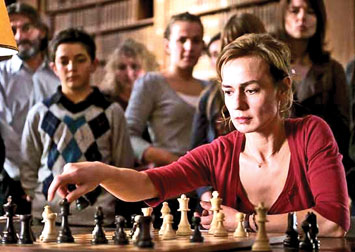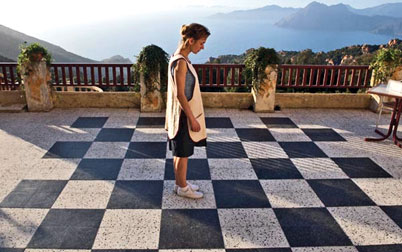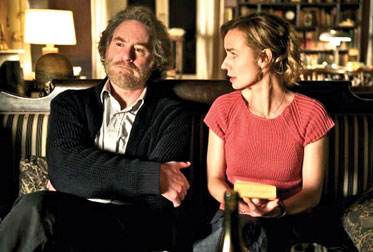|
Review
European Film Festival:
Joueuse
By Madeleine WIGHTMAN
 Caroline Bottaro's Joueuse, plucks the game of chess out of the
metaphorical realm of spy thrillers and rewrites it as a fable about
relationships and upward mobility. Caroline Bottaro's Joueuse, plucks the game of chess out of the
metaphorical realm of spy thrillers and rewrites it as a fable about
relationships and upward mobility.
Adapted from Bertina Henrichs's novel The Chess Player, this slight
but captivating movie (Ms. Bottaro's directorial debut) compares the
strategies of chess to the erotic maneuvers in a flirtatious pas de
deux.
At the same time, a woman's winning the game symbolises female
empowerment in a man's world and ascent from working-class drudgery to
the bourgeoisie. Hélène (Sandrine Bonnaire), the movie's sly,
middle-aged Cinderella, is an attractive chambermaid at a luxury hotel
in Corsica.
While going about her chores, she observes a chess game being played
by an American couple (Jennifer Beals and Dominic Gould) on the balcony
of their suite. Stealthy moves accompanied by insinuating eye contact
culminate with the woman's defeating the man and flashing Hélène a smile
of conspiratorial glee.
|

Scenes from the film
 |
Hélène takes the hint, and at a birthday party for Ange, a handsome
dockworker named Ange (Francis Renaud), she presents him with an
electronic chess set in the hopes of reigniting the spark in their
marriage. Ange is mystified and vaguely annoyed by the gift. When he
expresses no interest in learning the game, Hélène begins teaching
herself to play and quickly becomes obsessed.
Fairy tale
Joueuse is a lighthearted, grown-up fairy tale in which chess
consumes Hélène's imagination and transforms her life. As she mops a
black-and-white checkered floor, it becomes a surreal dreamscape. At a
restaurant she makes chess pieces out of crumbled bread and pushes them
around the squares of the red-and-white tablecloth.
The intimate looks exchanged by the characters as they compete for
advantage in a game in which the queen is the most powerful piece tell
us as much about them as anything they say. Sometimes chess even
suggests a mental striptease in which the players shed their defenses as
they exchange glances and dare each other to go forward. At other times
it conjures a war between the sexes, with Hélène, the feminist upstart
challenging male dominance.
Avid to learn more, she discovers a chess set in the house of Dr.
Kröger (Kevin Kline, in his first entirely French-speaking role), a
widowed American professor for whom she works as a part-time
housekeeper. She volunteers to clean his place in exchange for weekly
chess lessons. A mysterious figure suffering from an unidentified lung
ailment, Kröger agrees. When, after only a few lessons, she is regularly
beating him, he urges her to enter a local tournament.
In small but significant ways, Joueuse defies expectations. It
dangles the possibility of an affair between Hélène and Kröger in games
that the film likens to courtship. Yet their flirtation is never
physically consummated. Hélène's relationships with her husband, Ange
and rebellious teenage daughter, Lisa (Alexandra Gentil), undergo
surprising transformations.
Ange, initially threatened by Hélène's passion, which keeps her out
late and distracts her from housework, is initially so suspicious that
he follows her to a lesson and spies on her. But once he realizes that
she has a gift, his jealousy turns to admiration, and the flame of
desire is rekindled. Lisa, who is so ashamed and contemptuous of her
parents for being "poor" that she refuses to invite boyfriends to the
house, becomes her mother's fervent champion.
Bonnaire's Hélène subtly evolves from a harried, resentful domestic
wearing a perpetually hurt expression into a woman who discovers her
power. Kevin Kline, as the haughty, secretive professor with a kind
heart under a prickly exterior gives one of his finest screen
performances, executed with minute fluctuations in his body language.
When Kröger finally opens up about his home life, its not a dramatic
breakdown or a therapy session. It comes across as the real evolution of
a friendship - not a human connection that he's been avoiding, but one
he never anticipated.
And while the film very well could have explored cheap drama through
an affair or by indulging in Ange's fear of an affair, the quiet game
between Helene and Kröger has a sensuality to it that's far more
interesting than any conventional portrayal of coupling would have been.
Themes of midlife crises and female empowerment
Using chess as the central thread of this story, Joueuse isn't a film
about the game itself but rather the portrait of a woman's mid-life
crisis, with light doses of social commentary in the background.
Prisoner of a life without excitement, Hélène seems to be advancing
through life like a sleepwalker, stuck between her boring job as a
housemaid and her family; Ange, the distant husband and Lisa, the bratty
daughter. The she discovers the game which will provide her with a
much-needed escape from her daily routine.
The story can easily be described as a tale of self-empowerment for
women, where men are relegated to spectators of Hélène's rise. We follow
her transformation, from discreet housemaid and wife to local chess
star, with Kröger acting as the catalyst of her mutation.
Using Chess as a metaphor for this empowerment, the film is not
particularly subtle in delivering symbols to the spectator; the
dialogues between the characters underlining the messages the film
carries.
At the heart of Joueuse' is obviously the role of woman in society.
As we hear Hélène's coworker telling her that happiness should after all
be a quiet life with a husband and kids, we know that, obviously, this
isn't what Hélène or the filmmakers believe. Men such as Ange, Kröger or
even her daughter's boyfriend are portrayed as unconscious barriers to
women's ambitions.
Kröger even explains how he should have supported his wife's artistic
aspirations (which is perhaps why he is now looking for redemption by
helping Hélène).
Money
Of course, if this journey isn't about sex and money, it means that
what Hélène is going through is an intellectual mid-life crisis, success
at chess being one of the most obvious symbols of intellectual prowess.
The story isn't as groundbreaking as it could have been 50 years ago,
with so many women holding important positions in society, its impact
cannot be as great.
The fact that the story is set in Corsica makes it more relevant, as
women are still considered as housewives in certain Mediterranean
regions. As indeed they still are in many societies. The end of the film
is satisfying, when the viewer sees that Hélène has won her local
tournaments, (against many men) and that she is breaking free from her
social constraints and heading to Paris. "Joueuse" has a quiet beauty
and is a humble achievement.
It's rules and conventions are as apparent from the beginning as
those of the game depicted, but like a great game of chess, surprises
occur with the most graceful of moves.
|

